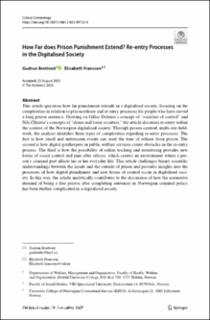How far does prison punishment extend? Re-entry processes in the digitalised society
Peer reviewed, Journal article
Published version
Permanent lenke
https://hdl.handle.net/11250/3105593Utgivelsesdato
2023Metadata
Vis full innførselSamlinger
- Artikler / Articles [1186]
- Publikasjoner fra CRIStin [1133]
Sammendrag
This article questions how far punishment extends in a digitalised society, focusing on the complexities in relation to prison release and re-entry processes for people who have served a long prison sentence. Drawing on Gilles Deleuze’s concept of “societies of control” and Nils Christie’s concepts of “dense and loose societies,” the article discusses re-entry within the context of the Norwegian digitalised society. Through person-centred, multi-site feld work, the analysis identifes three types of complexities regarding re-entry processes. The frst is how small and unforeseen events can reset the time of release from prison. The second is how digital gatekeepers in public welfare services create obstacles in the re-entry process. The third is how the possibility of online tracking and monitoring provides new forms of social control and pain after release, which creates an environment where a per son’s criminal past afects his or her everyday life. This article challenges binary scientifc understandings between the inside and the outside of prison and provides insights into the processes of how digital punishment and new forms of control occur in digitalised soci ety. In this way, the article analytically contributes to the discussion of how the normative demand of being a free person after completing sentences in Norwegian criminal policy has been further complicated in a digitalised society.
Beskrivelse
This article is licensed under a Creative Commons Attribution 4.0 International License, which permits use, sharing, adaptation, distribution and reproduction in any medium or format, as long as you give appropriate credit to the original author(s) and the source, provide a link to the Creative Com mons licence, and indicate if changes were made. The images or other third party material in this article are included in the article’s Creative Commons licence, unless indicated otherwise in a credit line to the material. If material is not included in the article’s Creative Commons licence and your intended use is not permitted by statutory regulation or exceeds the permitted use, you will need to obtain permission directly from the copyright holder. To view a copy of this licence, visit http://creativecommons.org/licenses/by/4.0/.

